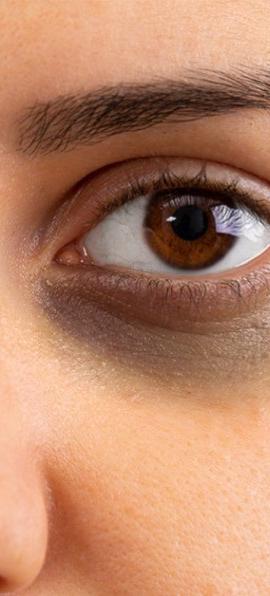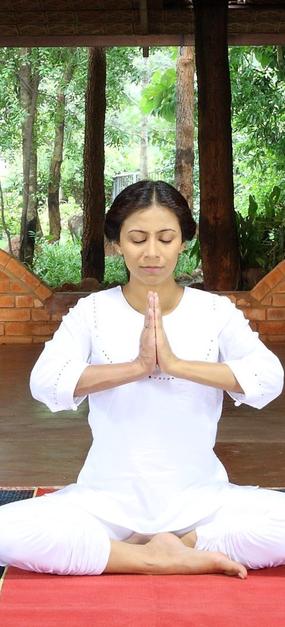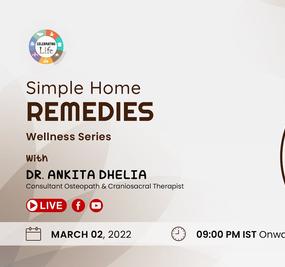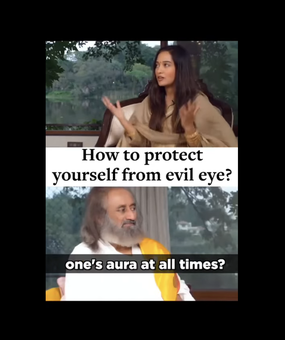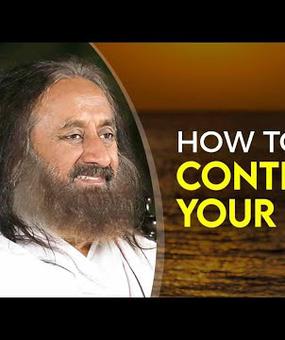They do say the eyes are a window to the soul. While that is true, our windows do n the eyes is tremendous, starting with an overexposure to gadgets from a young age. Keeping the eyes healthy and strong is simple – as long as we understand how our eyes work. And how our lifestyle impacts them.
Start the journey of healthy and strong eyes. Dr. Padmalochan shares insightful tips, debunks many myths and helps us understand the functioning of our eyes. Heading Sri Sri Netra Jyoti department, Dr. Padmalochan has an impressive body of work for more than past 12 years.
Q: Today’s lifestyle is dominated by the computer, television and the mobile phone. What are the consequences of this on our eyes? How can we keep the eyes healthy and strong?
Dr. Padmalochan: Yes, that’s very true. There are many things that one can do to keep the eyes healthy. There are very simple to follow.
Keep the computer screen below the eye level. Adjust the contrast on the screen. If possible, make it zero with minimum brightness. Nowadays, people are addicted to high contrast and maximum brightness. Everyone is using the LED screen. Unfortunately, LED lights are very harmful to the retina. It’s extremely essential to use a good quality screen, especially since the usage is so high these days.
I would also recommend proper lighting when working on a computer. Avoid using a screen in dim light or at night. Instead of quiet/low light, use halo light.
Everybody must do palming exercise for the eyes. Just rub your hands and immediately put them on your eyes. Imagine complete darkness in front of you, like it’s night time. Sit for five minutes and repeat the process. This is a very relaxing exercise and takes care of the eyes, naturally.
It’s best to restrict television viewing time to 15 to 30 minutes, especially for children. Also, sit at a distance which is at least ten times that of the screen. Rest your head on a sofa and keep the eyes relaxed, half open. When the eyes are half open, the eyes tend to blink normally – which is once every five or six seconds. Sometimes, we are so engrossed in watching something; we forget to blink our eyes.
Lastly, keep gadgets away when sleeping. If you can’t do so, then put them on the airplane mode. This will reduce the radiation coming from them.
Say yes to a healthy life
Q: Nowadays so many people, even children, have started wearing glasses. Could you tell us something about this? Is it difficult to get rid of spectacles?
Dr. Padmalochan: Let me tell you, the number will keep increasing if someone starts wearing glasses. Why? Your eye muscle doesn’t need to work as its dependent on glasses. So the muscle becomes weaker, and the number increases further.
Sometimes the glass are required to view objects that are far away. However, the doctor might ask you to wear the glass all the time. The spectacle meant for distant viewing is used to view objects that are close-by. What happens? The eye is further strained, increasing your number.
After you start wearing glasses, 90 percent of the eyeball movement is stopped. Usually, you turn the eyes sideways when you want to view an object that is on the side. However, you turn your head around with glasses, for the same action.
I think we are straining the eyes even more with spectacles. Instead, we have developed exercises and treatment to relax the eyes muscle. Gradually the power will come down. We are getting good results within an age group of 21 years. After 40 years, we can reduce the reading number.
Prevention is better than cure. Before the problem arises, take care of it.This is easy, especially for the eyes. There are simple ways to take care of the eyes, some of them are simple home remedies.
Q: We face day-to-day eye problems like dryness, tiredness, and redness. How does this happen? Are there any eye care home remedies to keep the eyes healthy?
Dr. Padmalochan: There is a gland in our eyes known as the tear and lacrimal gland. When we view screens a great deal, our eyes are strained, and this leads to the shrinkage of the Tear- gland’s channel. Tears become lesser; we might even feel a sensation in our eyes with some pain. Yes, we do cry sometimes. However, when we cry when we are disturbed, hormonal imbalances are created, which are unhealthy.
There are some tips to keep the eyes healthy. Take a candle and it in a dark room, gazing at the candle. The candle should be at the eye level, and the backbone should be straight. When you keep staring at the candle, your eyes will start tearing up. Close your eyes, relax and repeat this at least two-three times.
This kind of crying does not create any disturbance in mind. If a candle is unavailable, then simply focus on one point and let the tears come. This is a very good exercise for dry eyes. There are other treatments and exercises at our eye center as well that activate the gland.
Q: Can you tell us about eyes washes? In this busy schedule, we forget to wash our eyes?
Dr. Padmalochan: Yes, it is a very important process. The cornea is the only part of the body where there is no blood circulation. If there was blood circulation, then there will be no transparency. The oxygen supply from our lungs does not reach the cornea. However, the cornea takes oxygen from the outer environment. It’s very interesting as the cornea takes oxygen from the outer membrane in the form of tears. The oxygen first gets dissolved in tears and the cornea cells, then, accept it.
That is why contact lenses are not advisable for more than three hours. After three hours, avoid lenses for at least an hour. If you constantly wear contact lenses, the eye is prone to dryness and infection.
When we sleep, the eyes become sticky. This is due to lacrimal secretions, tear glands and the secretion from the cornea. It’s very important for the eyes to be thoroughly cleaned in the morning. If you don’t clean the eyes, problems like itching, redness, irritation and allergic reactions could arise. Generally, in our tradition, we wash our eyes, face and then do any work. But nowadays, we switch on the television or mobile phone as soon as we wake up in the morning.
If you wash your eyes properly in the morning, around 80 percent of eye problems will not occur.
Q: How to deal with dark circles below the eyes?
Dr. Padmalochan: Dark circles are due to increased strain on the eyes, also excessive use of gadgets. Recent research papers have shown that screen time could also damage your DNA. If you sit in front of a screen for long hours, your skin will start looking old. For dark circles, mix some sandal paste, turmeric and aloe vera in rose water. Leave it on for some time and wash with warm water.
There are also some milk, ghee treatments at our center which are very beneficial.
Healthy and strong eyes begin with a simple understanding of how the eye works, and best practices. Our lifestyle choices play a great role here.
Q: Lots of people nowadays are wearing sunglasses. Is it good for eyes & how important is sunlight for our eyes?
Dr. Padmalochan: Have you noticed that in very dim light, you can identify objects but not colors? Let’s understand a few things first. There are two types of cells in our retina: rod cells and cone cells. Rod cells work in dim light while cone cells work in bright light. If rod cells deteriorate, one is unable to see at night. This is known as night blindness. Some people are unable to see different types of colors; this is due to the deterioration of cone cells.
We can activate these cells by doing the sunning exercise. In our ancient time, we used to offer water to the morning sun or practice the Surya Namaskar in front of the sun.
In one research, a fish was kept in the dark room without a pinch of light. The fish was given nutrition supplements. However, after a year, it was found that the fish became transparent and blind.
So yes, to answer your question. Sunlight is very important for us.
I know many people are addicted to the sunglass. However, it’s not good for the eyes. When we wear sunglasses, the pupil does not contract. It dilates.
This is because the pupil dilates in dim light and contracts in the light. When the pupil does not dilate properly, it could cause glaucoma.
Also, colored sunglasses affect the cone cells.
A lot of advertisements promote the fact that UV rays are harmful to the eye. There’s nothing true in that. A lot of farmers work in fields; nothing happens to them. Yes, in some places like Sydney, the UV protection layer in the atmosphere is depleting. The intensity of UV rays is much higher, and sometimes UV proactive glasses are used. Such glasses are different. Sunglasses do not protect against UV rays.
You can use sunglasses in the snow or when at sea. The reflection is high at such places. Sometimes, in summer, you can use sunglasses too. However, it’s best not to get addicted to sunglasses.
Q. Could you tell us something about LASIK surgery? A lot of people are opting for LASIK surgery these days.
Dr. Padmalochan: Yes, many people are doing lasik surgery. Before surgery, the cornea is very circular, but after surgery, the cornea is cut with rays. The cornea cannot be regenerated. Every cell of the body – muscle cells, heart cells, liver cells – can be regenerated – but not the knob cells of the cornea. It’s permanent damage to the cornea.
Lot of people, who’ve done the surgery are fine for the first two-three years. Then they face a lot of dryness in the eyes. Also, many doctors say they don’t know the long-term impact – what happens after 10-20 years? Or in old age?
Some countries have stopped issuing licenses for this surgery. Clarity levels have come down, as well as contrast levels.
I think it’s a risky surgery. It’s better to bring your number down naturally.
Q: Is there any Ayurvedic treatment for a cataract?
Dr. Padmalochan: Yes. Let’s understand a cataract, first. There is a lens in our eyes which is a convex type of lens. But it’s not a glass lens like a camera. There is a transparent membrane which has a jelly-like fluid.Think of a raw egg. It has a yellow fluid and a transparent part. If you boil the egg, the transparent jelly becomes white. Similarly, the transparent part of the lens of our eye becomes white due to lack of oxygen. The cataract surgery replaced the white part with an artificial lens.
The artificial lens will create its problems. Our natural eye lens is contractile – it becomes thin when we look afar and becomes thick when we look close. The artificial lens cannot do this – either a sense of distant viewing / close viewing is given. Or one different lens for each eye.
Usually, retinal problems begin after four to five years after the operation. Cataract problems are common in people post 60 years. I would recommend you don’t go for an operation until your vision is completely blurred. You can opt-in for Ayurvedic treatments at the initial stages of cataract formation. We have seen very good results.



